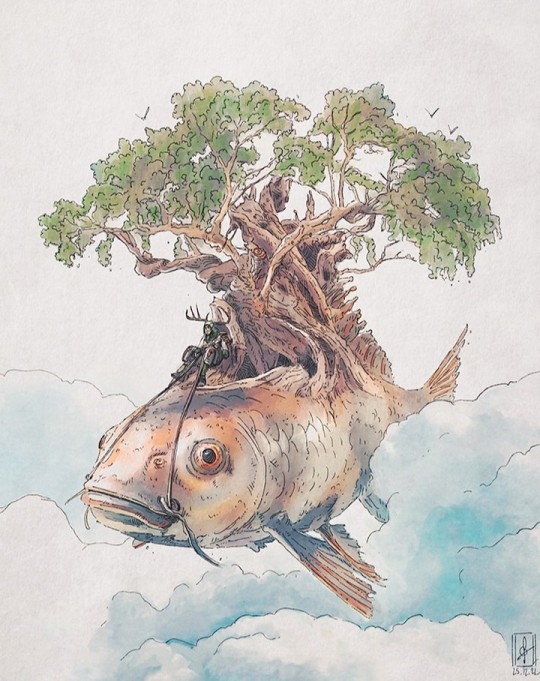Art blog themanyartsofknight and D&D sideblog possiblybadrpgideas. Personal blog, so I reblog a lot of stuff and occasionally impart my own wisdom to the masses. Ace, scientist, D&D nerd (she/they)
Don't wanna be here? Send us removal request.
Link
Just a little PSA for all our mental health (and chronic pain*) spoonies out there! A lot of doctors neglect to mention this little side effect, which means a lot of us are suffering extra from the heat without knowing why.
*Many psych meds are used to treat chronic pain as well, if you didn’t know!
35K notes
·
View notes
Text
Why are you using chatgpt to get through college. Why are you spending so much time and money on something just to be functionally illiterate and have zero new skills at the end of it all. Literally shooting yourself in the foot. If you want to waste thirty grand you can always just buy a sportscar.
22K notes
·
View notes
Text
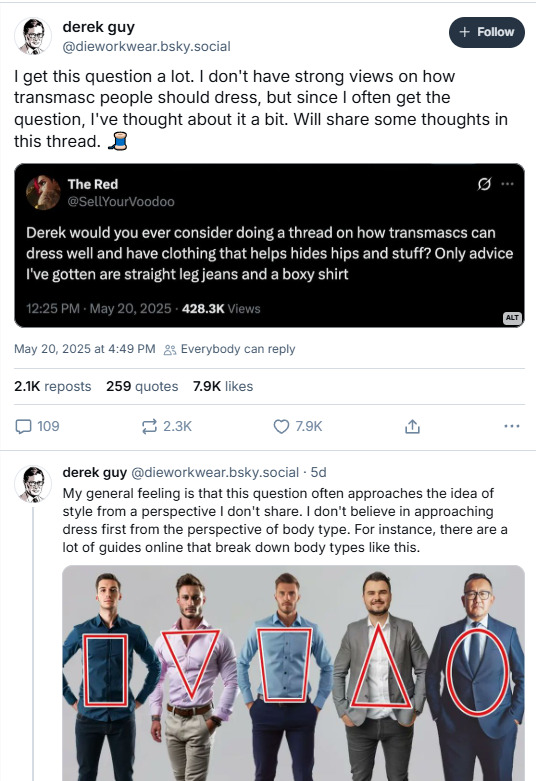
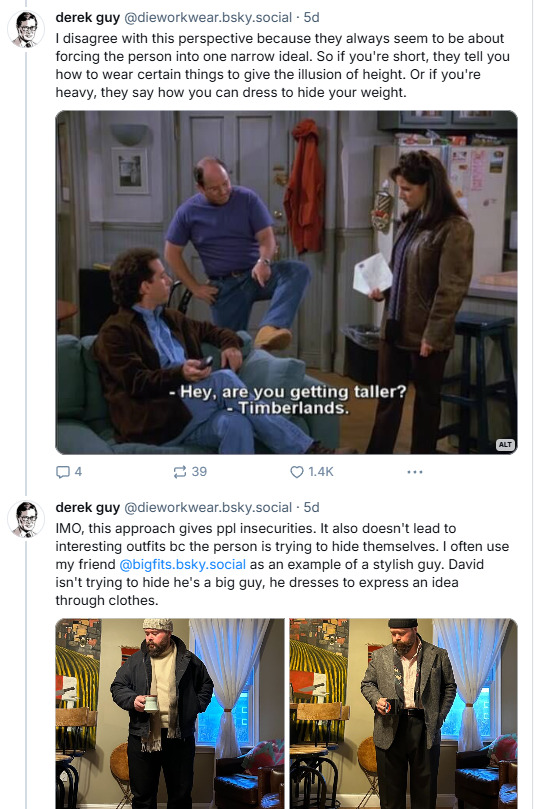
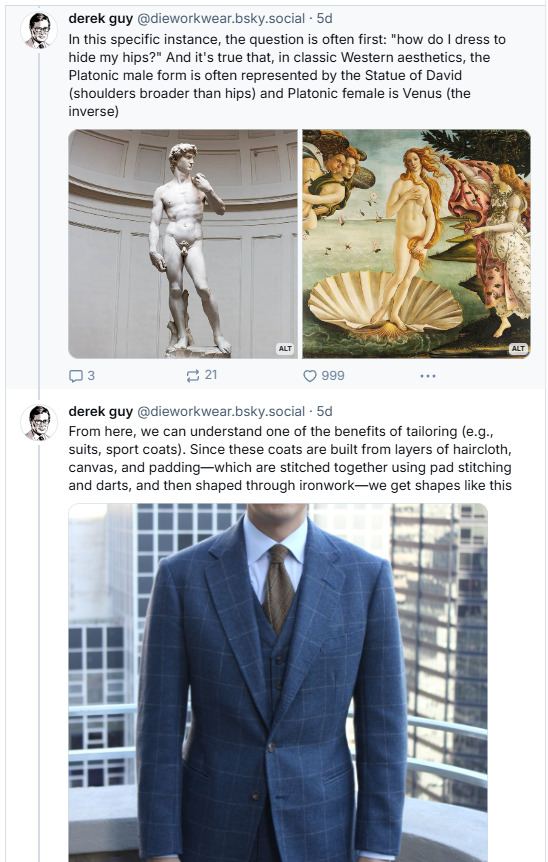
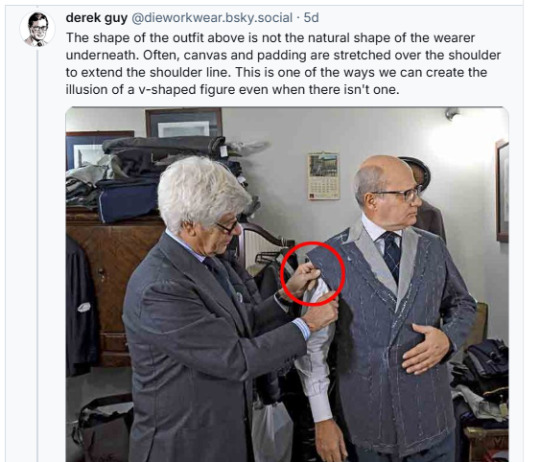
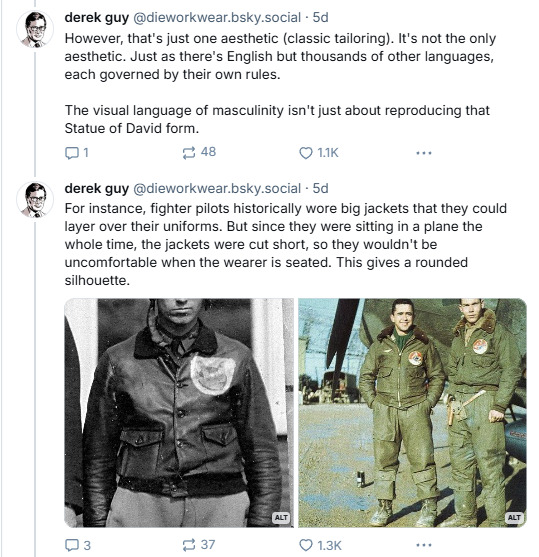
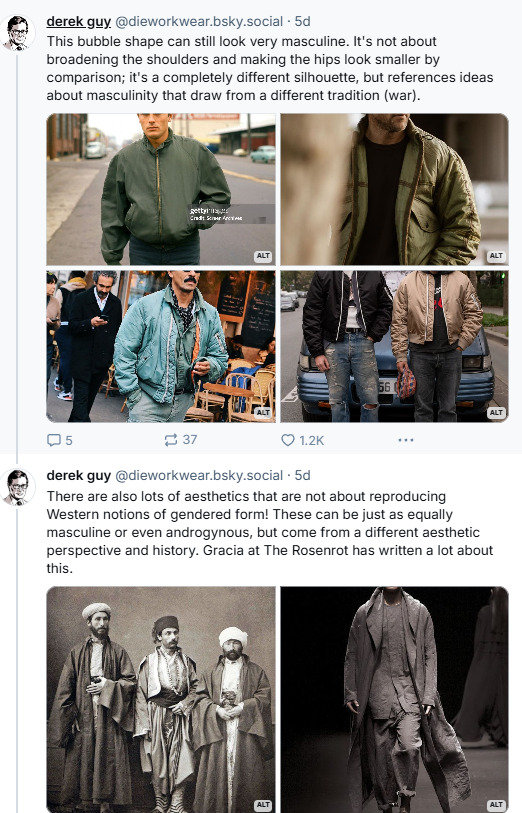
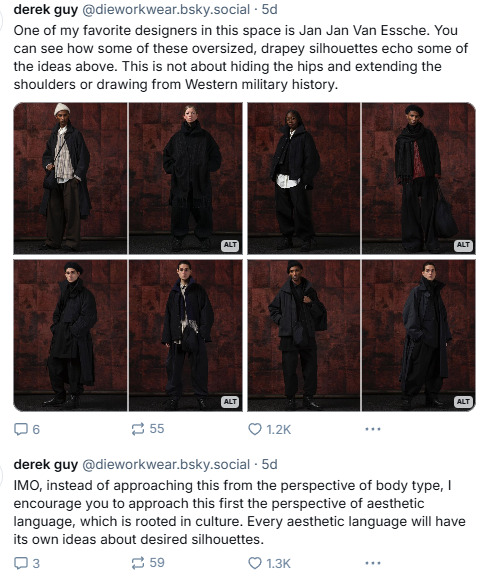
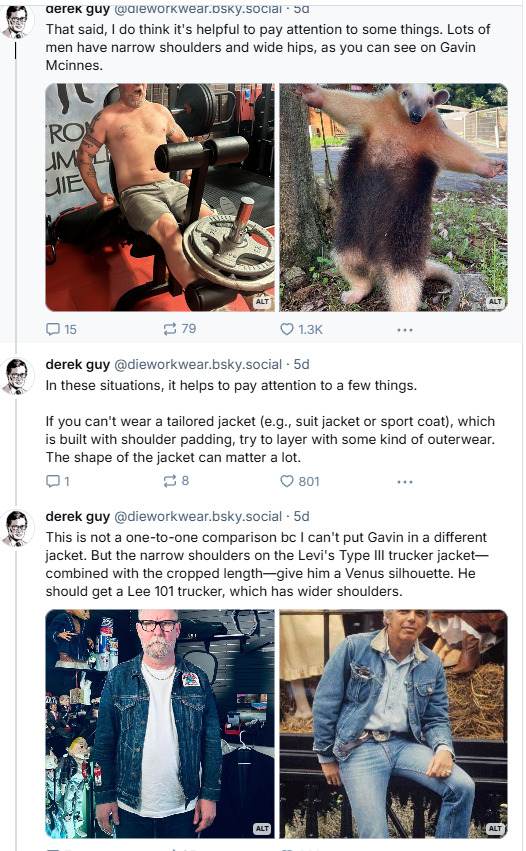
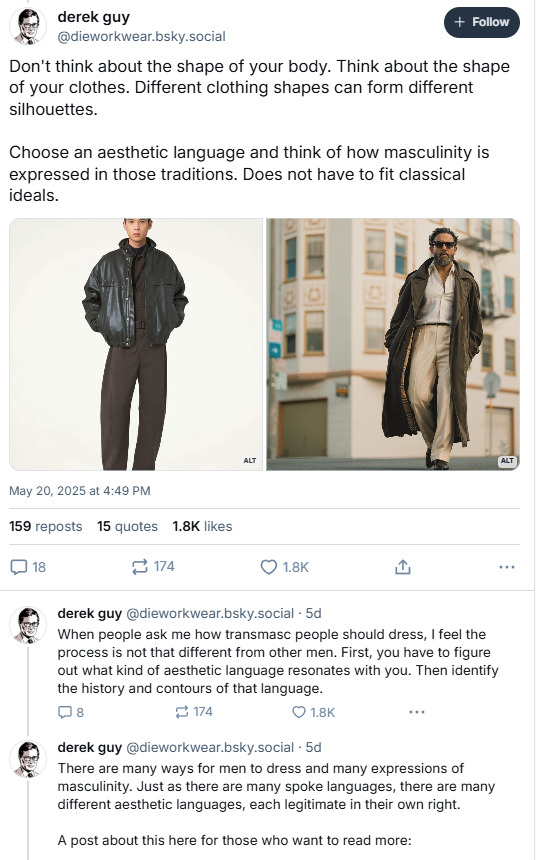
https://dieworkwear.com/2022/08/26/how-to-develop-good-taste-pt-1/
From the comments "In my experience clothing on anyone looks best when it is done with confidence. We are all different shapes and sizes. I was really struck by your post on dressing well that included John Goodman in a faded t-shirt and jeans. He rocks it!"
Excellent advice, whatever gender or style one is looking for. Thank you
I'm a trans guy and Derek, I can tell you my wardrobe has improved a huge amount simply by reading your threads. The "dress for your body type" stuff never worked well for me; your threads about putting together an intentional look and for getting a good fit - that's 99% of the game.
22K notes
·
View notes
Text
Hack for if you're struggling with ADHD paralysis and you can't get started on a task:
Step 1: Add some silly rule to the task to make it more interesting and whimsical.
Step 2: Pretend Sam Reich just told you to do it.
Here are a few examples that have worked for me recently.
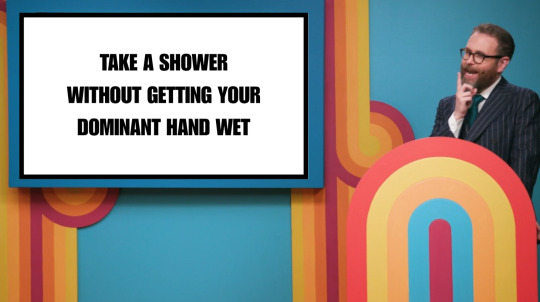
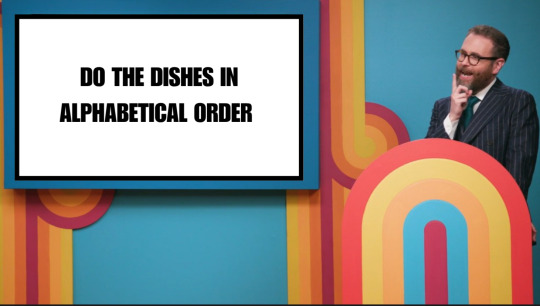
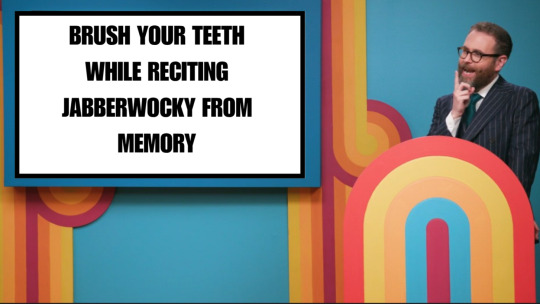
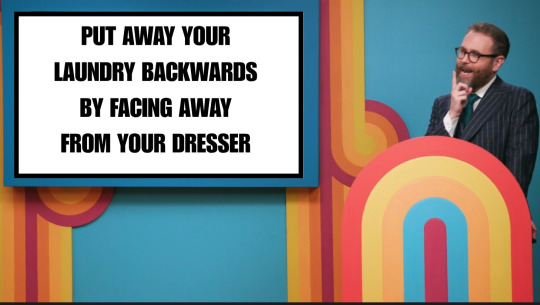
(Bonus points if you can hear the setup in your head. "Alright, players, for your next challenge" 🎶ding🎶)
18K notes
·
View notes
Text
academic dishonesty is not something you can spin as moral lol i do not want to share a career field let alone a social sphere with a bunch of chatgpt using ass bitches
67K notes
·
View notes
Text

Biodiversity can be achieved through executive dysfunction!
8K notes
·
View notes
Text

Why aren't we talking about the real reason male college enrollment is dropping? (Celeste Davis, Oct 6 2024)
"White flight is a term that describes how white people move out of neighborhoods when more people of color move in.
White flight is especially common when minority populations become the majority. That neighborhood then declines in value.
Male flight describes a similar phenomenon when large numbers of females enter a profession, group, hobby or industry—the men leave. That industry is then devalued.
Take veterinary school for example:
In 1969 almost all veterinary students were male at 89%.
By 1987, male enrollment was equal to female at 50%.
By 2009, male enrollment in veterinary schools had plummeted to 22.4%
A sociologist studying gender in veterinary schools, Dr. Anne Lincoln says that in an attempt to describe this drastic drop in male enrollment, many keep pointing to financial reasons like the debt-to-income ratio or the high cost of schooling.
But Lincoln’s research found that “men and women are equally affected by tuition and salaries.”
Her research shows that the reason fewer men are enrolling in veterinary school boils down to one factor: the number of women in the classroom.
For every 1% increase in the proportion of women in the student body, 1.7 fewer men applied.
One more woman applying was a greater deterrent than $1000 in extra tuition! (…)
Since males had dominated these professions for centuries, you would think they would leave slowly, hesitantly or maybe linger at 40%, 35%, 30%, but that’s not what happens.
Once the tipping point reaches majority female- the men flee. And boy do they flee!
It’s a slippery slope. When the number of women hits 60% the men who are there make a swift exit and other men stop joining.
Morty Schapiro, economist and former president of Northwestern University has noticed this trend when studying college enrollment numbers across universities:
“There’s a cliff you fall off once you become 60/40 female/male. It then becomes exponentially more difficult to recruit men.”
Now we’ve reached that 60% point of no return for colleges.
As we’ve seen with teachers, nurses and interior design, once an institution is majority female, the public perception of its value plummets.
Scanning through Reddit and Quora threads, many men seem to be in agreement - college is stupid and unnecessary.
A waste of time and money. You’re much better off going into the trades, a tech boot camp or becoming an entrepreneur. No need for college. (…)
When mostly men went to college? Prestigious. Aspirational. Important.
Now that mostly women go to college? Unnecessary. De-valued. A bad choice. (…)
School is now feminine. College is feminine. And rule #1 if you want to safely navigate this world as a man? Avoid the feminine.
But we don’t seem to want to talk about that."
32K notes
·
View notes
Text
i appreciated this study: "They Can't Read Very Well: A Study of the Reading Comprehension Skills Of English Majors At Two Midwestern Universities"
essentially, a pair of professors set out to test their intuitive sense that students at the college level were struggling with complex text. they recruited 85 students, a mix of english majors and english education majors - so, theoretically, people focusing on literature, and people preparing to teach adolescents how to read literature - and had them read-while-summarizing the first seven paragraphs of dickens's bleak house (or as much as they made it through in the 20 minute session). they provided dictionaries and also said students could use their phones to look up whatever they wanted, including any unfamiliar words or references. they found that the majority of the students - 58%, or 49 out of the 85 students - functionally could not understand dickens at all, and only 5% - a mere 4 out of the 85 students - proved themselves proficient readers (leaving the remaining 38%, or 32 students, as what the study authors deemed "competent" students, most of whom could understand about half the literal meaning - pretty low bar for competence - although a few of whom, they note, did much better than the rest in this group if not quite well enough to be considered proficient).
what i really appreciated about this study was its qualitative descriptions of the challenges and reading behaviors of what the authors call "problematic readers" (that bottom 58%), which resonated strongly with my own experiences of students who struggle with reading. here's their blunt big picture overview of these 49 students:
The majority of these subjects could understand very little of Bleak House and did not have effective reading tactics. All had so much trouble comprehending concrete detail in consecutive clauses and phrases that they could not link the meaning of one sentence to the next. Although it was clear that these subjects did try to use various tactics while they read the passage, they were not able to use those tactics successfully. For example, 43 percent of the problematic readers tried to look up words they did not understand, but only five percent were able to look up the meaning of a word and place it back correctly into a sentence. The subjects frequently looked up a word they did not know, realized that they did not understand the sentence the word had come from, and skipped translating the sentence altogether.
the idea that they had so many trouble with every small piece of a text that they could not connect ideas on a sentence by sentence basis is very familiar to me from teaching and tutoring, as was the habit of thought seen in the example of the student who gloms on to the word "whiskers" in a sea of confusion and guesses incorrectly that a cat is present - struggling readers, in my experience, seem to use familiar nouns as stepping stones in a flood of overwhelm, hopping as best they can from one seemingly familiar image to the next. so was this observation, building off the example of a student who misses the fact that dickens is being figurative when he imagines a megalodon stalking the streets of london:
She first guesses that the dinosaur is just “bones” and then is stuck stating that the bones are “waddling, um, all up the hill” because she can see that Dickens has the dinosaur moving. Because she cannot logically tie the ideas together, she just leaves her interpretation as is and goes on to the next sentence. Like this subject, most of the problematic readers were not concerned if their literal translations of Bleak House were not coherent, so obvious logical errors never seemed to affect them. In fact, none of the readers in this category ever questioned their own interpretations of figures of speech, no matter how irrational the results. Worse, their inability to understand figurative language was constant, even though most of the subjects had spent at least two years in literature classes that discussed figures of speech. Some could correctly identify a figure of speech, and even explain its use in a sentence, but correct responses were inconsistent and haphazard. None of the problematic readers showed any evidence that they could read recursively or fix previous errors in comprehension. They would stick to their reading tactics even if they were unhappy with the results.
i have seen this repeatedly, too - actually i was particularly taken with how similar this is to the behavior of struggling readers at much younger ages - and would summarize the hypothesis i have forged over time as: struggling readers do not expect what they read to make sense. my hypothesis for why this is the case is that their reading deficits were not attended to or remediated adequately early enough, and so, in their formative years - the early to mid elementary grades - they spent a lot of time "reading" things that did not make sense to them - in fact they spent much more time doing this than they ever did reading things that did make sense to them - and so they did not internalize a meaningful subjective sense of what it feels like to actually read things.
like, i've said this before, but the year i taught third grade i had multiple students who told me they loved reading and then when i asked them about a book they were reading revealed that they had absolutely no idea what was going on - on a really basic literal level like "didn't know who said which lines of dialogue" and "couldn't identify which things or characters given pronouns referred to" - and were as best as i could tell sort of constructing their own story along the way using these little bits of things they thought they understood. that's what "reading" was, in their heads. and they were, in the curriculum/model that we used at the private school where i taught, receiving basically no support to clarify that that was not what reading was, nor any instruction that would actually help them with what they needed to do to improve (understand sentences) - and i realized over the course of that year that the master's program that had certified me in teaching elementary school had provided me with very little understanding of how to help these kids (with perhaps the sole exception of the class i took on communications disorders, not because these kids had communications disorders but because that was the only class where we ever talked, even briefly, about things like sentence structures that students may need instruction in and practice with to comprehend independently). when it comes to the literal, basic understanding of a text, the model of reading pedagogy i was taught has about 6 million little "tools" that all boil down to telling kids who functionally can't read to try harder to read. this is not productive, in my experience and opinion, for kids whose maximum effort persistently yields confusion. but things are so dysfunctional all the way up and down the ladder that you can be a senior in college majoring in english without anyone but a pair of professors with a strong work ethic noticing that you can't actually read.
couple other notes:
obviously it's a small study but i'm not sure i see a reason to believe these are particularly outlierish results (ACT scores - an imperfect metric but not a meritless one IMO for reading specifically, where the task mostly really is to read a set of texts written for the educated layperson and answer factual questions about them - were a little bit above the national average)
the study was published last year, but the research was conducted january to april 2015. so there's no pandemic influence, no AI issue - these are millennials who now would span roughly ages 28-32 (i guess it's possible one of the four first-year students was one of the very first members of gen z lol). if you're in your late 20s or early 30s, we are talking about people your age, and whatever the culprit is here, it was happening when you were in school.
i think some people might want to blame this on NCLB but i find this unconvincing for a variety of reasons. first of all, NCLB did not pass because everyone in 2001 agreed that education was super hunky-dory; in fact, the sold a story podcast outlines how an explicit goal of NCLB was to train teachers in systematic phonics instruction, because that was not the norm when NCLB was passed, and an unfortunate outcome was that phonics became politicized in ed world. second, anyone who understands anything about reading should need about ten minutes max to spend some time on standardized test prep and recognize that if your goal is truly to maximize scores... then the vast majority of your instructional time should be spent on improving actual reading skills because you actually can't meaningfully game these tests by "practicing main idea questions" (timothy shanahan addresses this briefly near the top of this post). so i find it very difficult to believe that any school that pivoted to multiple choice drill time in an attempt to boost reading scores was teaching reading effectively pre-NCLB, because no set of competent literacy professionals would think that would work even for the goal of raising test scores. third, NCLB mandated yearly testing in grades 3-8 but only one test year in high school; kansas set its reading and math test year in high school as tenth grade. so theoretically these kids all had two years of sweet sweet freedom from NCLB in which their teachers could have done whatever the fuck they wanted to teach these kids to actually read. the fact that they didn't suggests perhaps there were other problems afoot. fourth, and maybe most saliently for this particular study, the sample text was the first seven paragraphs of a novel - in other words, the exact kind of short incomplete text that NCLB allegedly demanded excessive time spent on. i'm not really sure what universe it makes sense in that students who can't read the first seven paragraphs of a novel would have become much better reader if everything else had been the same but they had been making completely wack associations based on nonsense guesses for all 300 pages instead. (if you read the study it's really clear that for problematic readers, things go off the rails immediately, in a way that a good program targeted at teaching mastery of text of 500 words or less would have done something about.)
all but 3 of the students reported A's and B's in their english classes and, again, 69% of them are juniors and seniors, so like... i mean idk kudos to these professors for being like "hold up can these kids actually read?" but clearly something is wack at the college level too [in 2015] if you can make your way through nearly an entire english major without being able to read the first seven paragraphs of a dickens novel. (once again i really do encourage you to look at the qualitative samples in the study, lest you think i am being uncharitable by summarizing understandable misunderstandings or areas of confusion that may resolve themselves with further exposure to the text as "can't read.") not to mention the fact that most students could not what they had learned in previous or current english classes and when asked to name british and american authors and/or works of the nineteenth century, roughly half the sample at each college could name at most one.
the authors of the study are struck by the fact that students who cannot parse the first 3 sentences of bleak house feel very confident about their ability to read the entire novel, and discover that this seeming disconnect is resolved by the fact that these students seem to conceptualize "reading" as "skimming and then reading sparknotes." i think it's really tempting to Kids These Days this phenomenon (although again these are people who in some cases have now been in the workforce for a decade) and categorize it as laziness or a lack of effort, but i think that there is, as i described above, a real and sincere confusion over what "reading" is in which this makes a certain logical sense because it's not like they have some store of actual reading experiences to compare it to. i also think it's pretty obvious looking at just how wildly severed from actual textual comprehension their readings are that these are not - or at least not entirely - students who could just work harder and master the entirety of bleak house all on their own. like i don't think you get from "charles dickens is describing a bunch of dinosaur bones actually walking the streets of london" to comfortably reading nineteenth century literature by just trying harder. i really just don't (and i say that acknowledging i personally have had students who like... were good readers if i was forcing them to work at it constantly... but i have also had students, including ones getting ready to enter college, who were clearly giving me everything they had and what they had was at the present moment insufficient). i think that speaks to a missing skillset that they don't know are missing, because they don't have any other experience of "reading" to compare it to.
just wanna highlight again that although they don't give the breakdown some of these students are not just english majors but english education majors a.k.a. the high school english teachers of tomorrow. some of them may be teaching high school english right now, in case anyone wishes to consider whether "maybe some high school english teachers can't read the first seven paragraphs of bleak house?" should be kept in mind when we discuss present-day educational ills.
15K notes
·
View notes
Text
Books are like yarn in that if you buy them from a small local shop then you're actually performing a civic duty and you can buy as much as you want without feeling guilty. So actually my towering TBR pile and stash of untouched yarn is kind of heroic if you think about it,
2K notes
·
View notes
Text
okay so if you need more veggies/fruit, protein or fibre (bc most people do NOT eat enough) in your diet but you struggle to do so, hear me out:
look up recipes (especially snack recipes) that are child/toddler/baby-friendly
i can guarantee there is a woman with a cooking blog out there who has found away to pack a bunch of vegetables into a surprisingly delicious little snack for her kids. this process has never failed me when i feel like i am not eating enough fruits and veggies. my entire flat is eating spinach muffins at the moment, which doesn’t sounding particularly appealing to most people and yet somehow. they’re delicious.
33K notes
·
View notes
Text
A company making wooden wind turbine blades has successfully tested a 50-meter-long prototype that’s set to debut soon in the Indian and European markets.
Last year, the German firm Voodin successfully demonstrated that their laminated-veneer timber blades could be fabricated, adapted, and installed at a lower cost than existing blades, while maintaining performance.
Now, Voodin has announced a partnership with the Indian wind company Senvion to supply its 4.2-megawatt turbines with these wooden blades for another trial run.
Wind power has accumulated more than a few demerit points for several shortfalls in the overall industry of this fossil-fuel alternative.
Some of these, such as the impact on bird life, are justified, but none more so than the fact that the turbine blades are impossible or nearly impossible to recycle, and that they need to be changed every 25 years.
Wind turbine blades are made from a mixture of glass and carbon fiber heated together with sticky epoxy resin, and these materials can’t be separated once combined, which means they go into landfills or are incinerated when they become too battered to safely operate.
GNN has reported that folks will occasionally find second-life value in these giant panels, for example in Denmark where they are turned into bike shelters. In another instance, they’re being used as pedestrian bridges.
But there are way more wind turbine blades being made every year than pedestrian bridges and bike shelters, making the overall environmental impact of wind power not all green.
“At the end of their lifecycle, most blades are buried in the ground or incinerated. This means that—at this pace—we will end up with 50 million tonnes of blade material waste by 2050,” Voodin Blade Technology’s CEO. Mr. Siekmann said recently. “With our solution, we want to help green energy truly become as green as possible.”
The last 15 years have seen rapid growth in another industry called mass timber. This state-of-the-art manufacturing technique sees panels of lumber heat-pressed, cross-laminated, and glued into a finished product that’s being used to make skyscrapers, airports, and more.
At the end of the day though, mass timber products are still wood, and can be recycled in a variety of ways.
“The blades are not only an innovative technological advancement but a significant leap toward sustainable wind production,” said Siekmann, adding that this isn’t a case of pay more to waste less; the blades cost around 20% less than carbon fiber.
Additionally, the added flexibility of wooden blades should allow for taller towers and longer blades, potentially boosting the output of turbine by accessing higher wind speeds.
Now partnered with Voodin, Senvion will begin feasibility analysis in the next few months, before official testing begins around 2027.
11K notes
·
View notes
Text
Do any of u have decent recipes that are like 5 ingredients (not including spices) and take 45 mins or less to prepare i gotta stop eating sandwiches for dinner
136K notes
·
View notes
Text
hey americans there is a recall on testosterone gel because they found benzene in it! please check the lot numbers on your batches, benzene is really not something you want to be rubbing into your skin, also you might be eligible for compensation because this is just insane what the fuck


more on this page:
57K notes
·
View notes
Text
this quote from hbomberguy’s plagiarism video really resonated with me:
“creative people have trouble recognising their skills as skills, because eventually they feel like second nature. […] this stuff really is valuable. if it wasn’t, people wouldn’t be stealing it. creativity doesn’t feel special or unique until you realise people have to plagiarise it”
your craft is and always will be valuable, please never let anyone make you doubt that
68K notes
·
View notes










